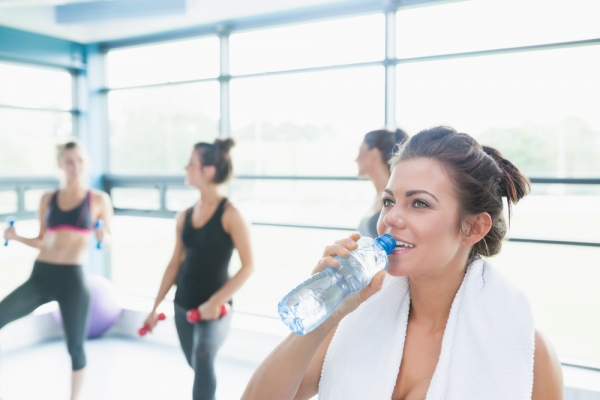“If you’re thirsty, you’re already dehydrated.” This nugget of knowledge came from my swim coach when he explained to us the importance of staying hydrated at a meet. Coach was on the right track, but not 100 percent correct. Thirst is a good indicator that you should grab a drink, but doesn’t necessarily mean you’re dehydrated.
Trying to figure out when and how much water you need to drink before, during, and after a workout isn’t as easy as it may seem. Our friends at Shape Magazine are trying to make sense of it by asking: how much should we drink and when?
If you don’t drink enough water before and during exercise, you risk experiencing dehydration symptoms like headache and dizziness. If you drink too much, you’re going to leave feeling bloated and unpleasant.
This is especially a problem in fitness classes where you’re guaranteed to sweat, like hot yoga and spinning.
For classes like those, Shape recommends drinking 16 ounces of water within 30 minutes of the start of your workout.
Post-workout, things get a little more complicated. It turns out there’s a way to determine exactly how you should replenish liquid lost during exercise. Warning to those who are not mathematically-inclined, it involves some calculating.
Brendon McDermott, Ph.D. told Shape:
1. First, weigh yourself (in kilograms) before and after exercising, without your workout clothes.
2. Then, find the difference in the two weights and add the number of liters of liquid you consumed while exercising.
2. Divide that number by the length of the class or workout session in hours.
4. The resulting number is your sweat rate, and your recommended rate of consumption.
Don’t worry if you didn’t get all that. Gatorade has a fluid loss calculator that can help you figure out how much hydration your body needs to exercise and recover properly.
When you figure out how much you lose during a workout, it’s important you take in that much within four to six hours post-exercise. Consuming too little will result in dehydration, and consuming to0 much will cause you to over-hydrate. Neither of which are pleasant, but with your new method of figuring out exactly how much to drink, both are avoidable!
Also Read:
5 Ways to Send Your Metabolism into Overdrive

